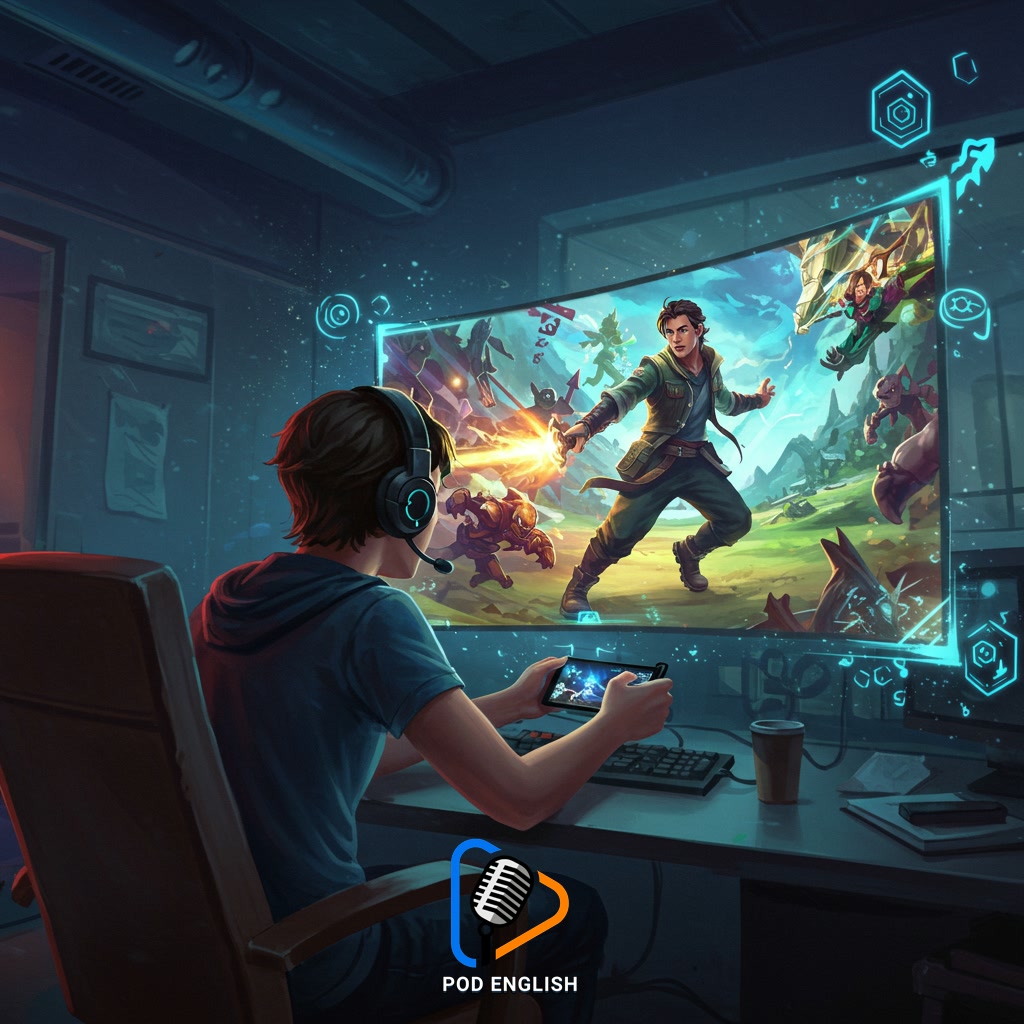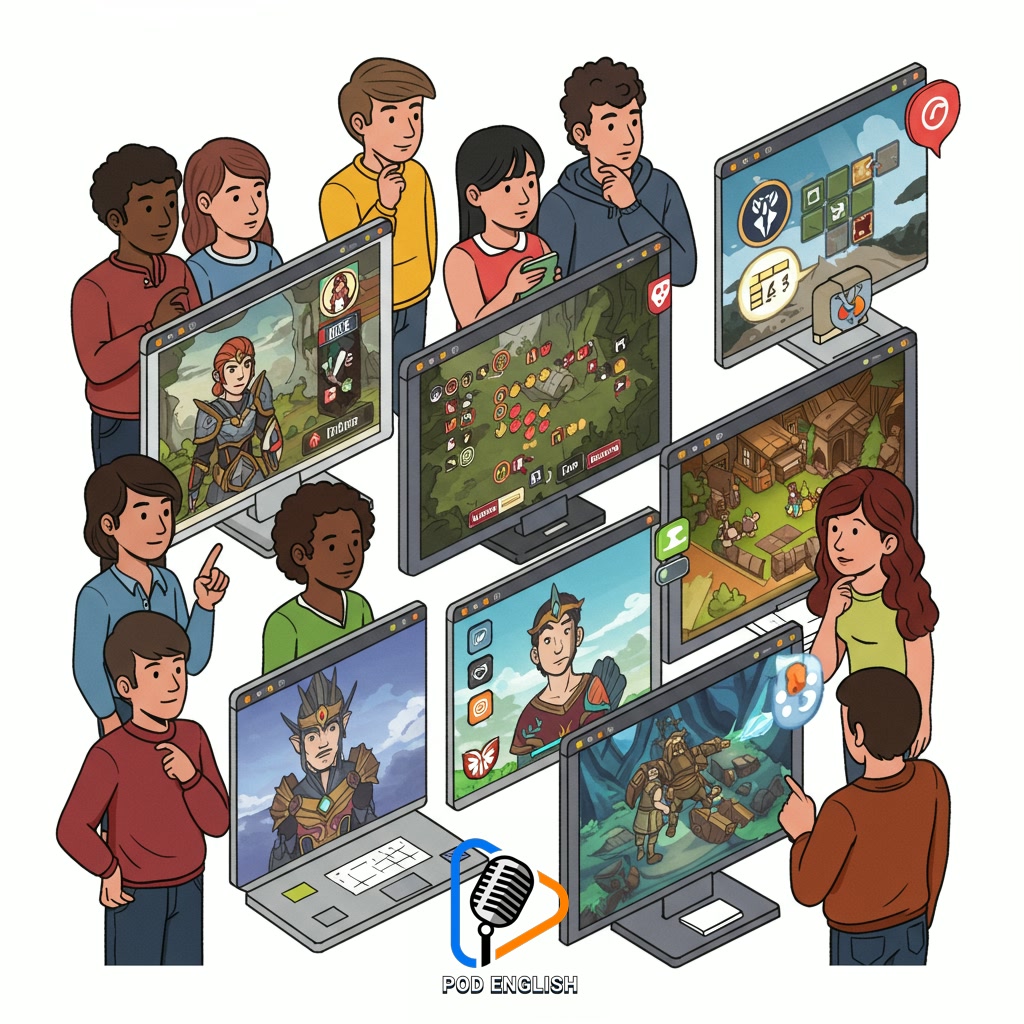Learn English
Level Up Your English: Fun and Effective Language Practice Through Video Games

This content explores how video games offer a fun and effective approach to practicing English. It highlights methods to enhance your language skills, including vocabulary and listening comprehension, within interactive gaming environments. Discover how turning your gaming time into focused practice can help you level up your English proficiency.
Table of Contents
- Section 1: Why Video Games Are a Powerful Tool for English Learning
- Section 2: Targeting Language Skills: How Games Improve Reading, Listening, and Vocabulary
- Section 3: Choosing the Right Game: Genres and Styles for Different Learners
- Section 4: Strategies for Effective Practice While You Play
- Section 5: Beyond the Game: Using Communities for Speaking and Interaction
- Section 6: Putting It All Together: Integrating Gaming into Your Study Routine
Section 1: Why Video Games Are a Powerful Tool for English Learning
Video games offer a unique and highly effective way to practice English because they create an immersive environment. Unlike traditional methods, games provide real-time interactions and challenges that require you to understand and respond in English. You encounter vocabulary and phrases used in natural contexts, making them easier to remember. The interactive nature keeps you engaged and motivated, encouraging repeated exposure to the language. Whether you’re following a story, solving puzzles, or communicating with others (in multiplayer games), you are actively using and improving your listening, reading, and even speaking or writing skills in a fun way. This makes gaming a powerful supplement to formal English study.

Why Video Games Are a Powerful Tool for English Learning
Section 2: Targeting Language Skills: How Games Improve Reading, Listening, and Vocabulary
Diving deeper into the immersive world of video games reveals specific ways they target and strengthen core English language skills. Reading practice comes naturally through quest logs, character dialogue subtitles, item descriptions, and in-game menus. Players constantly engage with written English to understand objectives and navigate the virtual environment. Listening comprehension is honed by processing spoken dialogue from characters, voiceovers for tutorials, and environmental cues. The need to understand instructions and story elements in real-time pushes players to improve their auditory processing. Vocabulary expands significantly as players encounter new words and phrases repeatedly in context, learning their meaning through direct interaction and necessity within the game world. This active engagement makes the learning process dynamic and memorable.

Targeting Language Skills: How Games Improve Reading, Listening, and Vocabulary
Section 3: Choosing the Right Game: Genres and Styles for Different Learners
Building on how games integrate language practice, selecting the right game genre is key to maximizing your learning. Different game types naturally emphasize different skills. Role-Playing Games (RPGs), for instance, excel in providing extensive reading practice through detailed quest descriptions, lore, and character dialogue, building vocabulary and comprehension. Adventure and story-driven games are fantastic for listening practice, featuring voiced conversations and narratives that improve your ability to understand spoken English. Puzzle games often require careful reading of instructions and logical deduction, honing your understanding of command structures and precise language. Consider your current learning goals and preferred style: are you focusing on reading, listening, vocabulary, or understanding instructions? Matching the game genre to your needs makes practice more effective and enjoyable.

Choosing the Right Game: Genres and Styles for Different Learners
Section 4: Strategies for Effective Practice While You Play
Building on how games integrate language practice, selecting the right game genre is key to maximizing your learning. Different game types naturally emphasize different skills. Role-Playing Games (RPG… To truly level up your English while gaming, you need to be strategic and actively engage with the language presented. Don’t just passively play through the story or ignore the details. Make a conscious effort to listen carefully to character dialogue, paying attention to pronunciation and intonation. Read everything you encounter – quest descriptions, item stats, character backstories – as this is excellent practice for expanding your vocabulary and improving reading comprehension. If the game allows, use in-game chat or voice communication to interact with other players, practicing your writing and speaking skills in a real context. Keep a digital or physical notebook handy to quickly jot down new words or phrases you want to look up later. By turning these simple actions into habits, you transform your leisure time into focused, effective language practice.

Strategies for Effective Practice While You Play
Section 5: Beyond the Game: Using Communities for Speaking and Interaction
While choosing the right game genre lays a strong foundation for language practice, the real power of gaming for English learning often lies beyond the solo experience. Engaging with online gaming communities offers invaluable opportunities for practicing speaking and interacting in English. Join voice chat sessions with teammates to coordinate strategy, ask questions about the game, or simply chat casually. Participate in game-related forums or social media groups to read discussions, write posts, and respond to others’ comments. These interactions provide authentic, real-time communication practice in a context you enjoy. Don’t be afraid to make mistakes; most online communities are supportive of learners. This active participation builds confidence and helps you use vocabulary and grammar learned through gameplay in practical conversation.

Beyond the Game: Using Communities for Speaking and Interaction
Section 6: Putting It All Together: Integrating Gaming into Your Study Routine
Following the exploration of various game types and the benefits of engaging with online communities, the next crucial step is to intentionally weave gaming into your broader English study plan. This isn’t about replacing traditional methods entirely, but rather about using gaming as a dynamic, engaging supplement. Consider dedicating specific time slots in your week for ‘English Gaming Sessions’, perhaps focusing on games rich in dialogue after a vocabulary review, or joining voice chat sessions after practicing listening exercises. Integrate active note-taking – keep a digital or physical notebook handy to jot down new words, phrases, or confusing grammar points encountered during gameplay. Review these notes later, perhaps incorporating them into flashcards or practice sentences. Think of gaming time as active practice rather than passive entertainment; approach it with the goal of observing, understanding, and using the language in a real-time context. By strategically planning *when* and *how* you game for language practice, you transform leisure into a powerful learning tool that complements your existing routine.

Putting It All Together: Integrating Gaming into Your Study Routine













